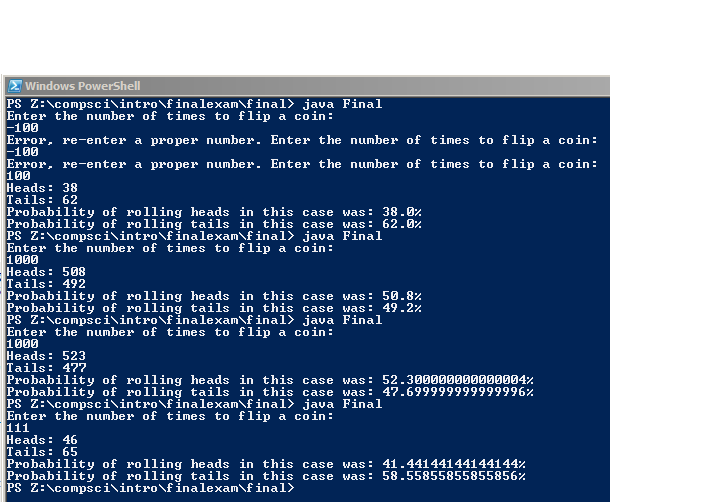First Semester Final Exam
Code
///Name: Cody Swain
///Period: 6
///Project Name: Final
///File Name: Final.java
///Date: 1/22/16
import java.util.Random;
import java.util.Scanner;
public class Final
{
public static void main( String[] args )
{
Scanner keyboard = new Scanner(System.in);
Random r = new Random();
int x, heads, tails, flips;
heads = 0;
tails = 0;
flips = 0;
while ( flips <= 0 ){ //use a while loop to ask them for a correct number, and keep asking if they input an incorrect number.
System.out.println( "Enter the number of times to flip a coin: ");
flips = keyboard.nextInt();
if (flips <= 0 ){
System.out.print( "Error, re-enter a proper number. " );
}
}
for ( x = 0; x < flips; x++ ){ //for loop is the easiest way to make sure the coin flip function occurs the amount of times the user inputs.
int y = 1 + r.nextInt(2); //generates either a 1 or 2
if ( y == 1 ){
heads++; //adds 1 to existing value of "heads" if number generated is a 1.
}
else if ( y == 2 ){ //adds 1 to existing value of "tails if the number generated is 2.
tails++;
}
}
double probHeads = (double)heads / flips;
double probTails = (double)tails / flips;
System.out.println( "Heads: " + heads );
System.out.println( "Tails: " + tails );
System.out.println( "Probability of rolling heads in this case was: " + probHeads*100 + "%" );
System.out.println( "Probability of rolling tails in this case was: " + probTails*100 + "%" );
}
}
/*
To get as close as possible to 50%, it is optimal to flip the coin as many times as possible. So within the range of an interval, 1000000000 or 1x10^9 is a consistent number to get as close to 50% as possible.
*/
Picture of the output
